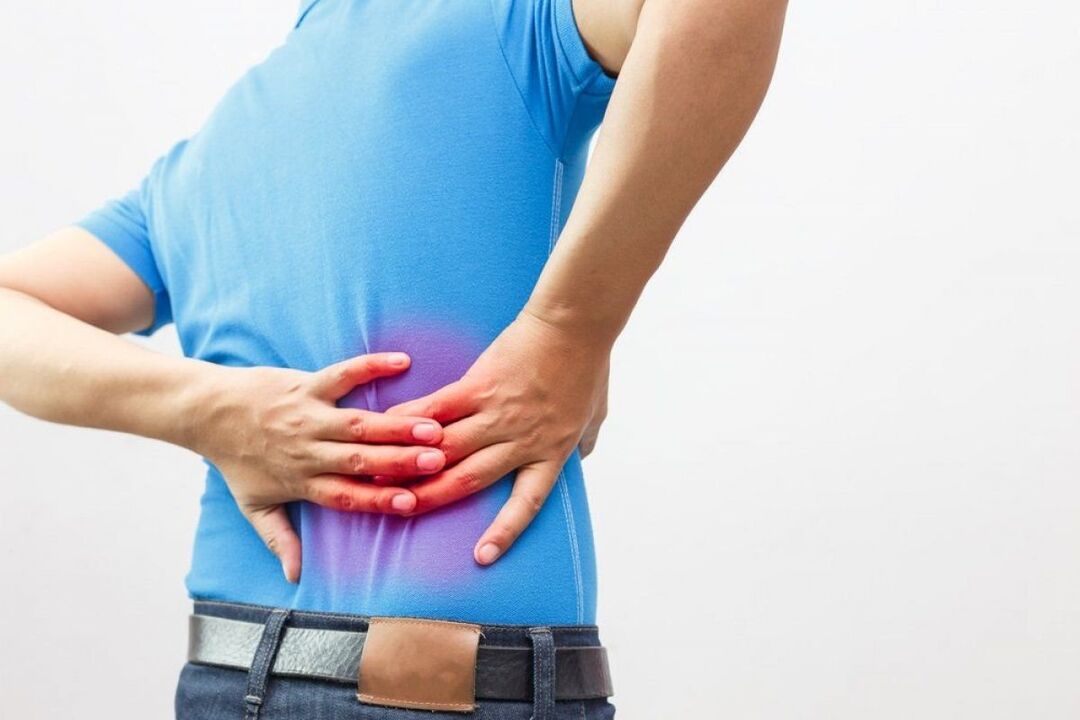
What you need to know about back pain
When to see a doctor
- Acute back pain does not go away within 2-3 days;
- Chronic pain that lasts for more than a week without improvement;
- Pain that occurs suddenly and for no apparent reason;
- Pain often occurs after an injury;
- Back pain radiates to legs, knees, feet.
- temperature rise;
- Limited movement of arms or legs;
- A feeling of numbness in the extremities;
- drastic changes in blood pressure;
- Painkillers do not help relieve pain;
- Loss of consciousness occurs;
- Problems with internal organ function;
- There are signs of poisoning;
- Bleeding begins.
- Computer or driving related work, strenuous physical activity, stress;
- Perform intensive training in the gym without the supervision of a trainer;
- working in forced postures while sitting or standing;
- overweight.
Why does my back hurt?
- Osteochondrosis, spondylosis, spondyloarthropathies;
- scoliosis, kyphoscoliosis;
- Herniated or herniated disc;
- Radiculitis or low back pain, inflammation of the sciatic nerve;
- spinal stenosis;
- spinal instability and fractures;
- intercostal neuralgia;
- Overexertion, hypothermia, or bruised back muscles;
- Spinal ligament damage;
- Myositis.
Pregnancy and back pain
How to identify disease by pain type
| pain type | What disease causes it? |
|---|---|
| It is acute both when conducted (radiated) and non-conducted (radiated). | Osteochondrosis. Persistent pain in the back that sometimes radiates into the legs and worsens when lifting heavy objects, coughing, or sneezing. Back pain can last for minutes, hours, or days. |
| Intervertebral hernia. Pain occurs when lifting heavy objects, bending, and turning to one side. Then pain and weakness develop in one of the legs. Back pain when moving, coughing, or sneezing. | |
| Radiculitis. The pain is sharp or dull. Usually on one side, radiating to the calf, buttocks, thighs, and calves. This sensation intensifies with changes in body position and may be accompanied by numbness, tingling, burning, itching, or a "pins and needles" sensation. | |
| chronic and acute pain | Muscle strain, myositis, working in an uncomfortable position for a long time, lifting heavy objects, sudden movements, hypothermia. |
| Low back pain. It affects people who do strenuous physical labor. Severe back pain usually stops after a few days but may last two to three weeks. | |
| Intervertebral disc displacement. It is caused by osteochondrosis, heavy lifting, heavy physical labor, etc. | |
| chronic | Spondylosis. The soreness may be accompanied by numbness and weakness in the legs. Cervical spondylosis can cause pain in the back of the head, shoulders, and when turning the head. |
| pain | Inflammation of the muscles of the back and lumbar spine. The disease occurs after hypothermia or muscle strain. The pain is not severe and lasts a long time. The muscles in the affected area are dense and painful when tense. |
| Conducted (radiating) pain in the legs | Inflammation of the sciatic nerve. Lumbar hernia. Back pain in the lumbar and sacral areas. Pain in the buttocks, back of the thigh, calf, or foot. |
diagnosis method
- MRI. Magnetic resonance imaging
- Ultrasound examination (ultrasound)
- Electrocardiogram (ECG)
- laboratory research
Ways to Treat Back Pain
- Resonant Wave Ultra High Frequency Therapy
- Rehabilitation training on the Thera-Band machine
- joints and spine blocks
- medical treatement
- shockwave therapy
diagnosis method
Ways to Treat Back Pain
What to do if you have low back pain
- Lie down in a comfortable position where you feel the least pain and stop straining your muscles. Stay in this position for at least 20 minutes until the pain subsides.
- Do not sit forward, carry heavy objects, or engage in exercise until the pain subsides.
- Contact your doctor immediately.
- Lie in bed and minimize movement to ensure maximum calm. Peace is your best friend.
- Place a soft pillow under your back to relieve pressure on your spine.
- If you have a suitable mild pain reliever, you can take pills to reduce pain, but it's best not to do this. See the next paragraph for why.
- It is recommended not to consume any food or drink other than plain water as this may cause disruption if emergency surgery is required (many surgeries can only be performed on an empty stomach). It is also recommended not to give any medication or heat the problem area as this will distort the clinical picture and prevent you from correctly diagnosing the problem and thus prescribing the correct treatment plan.
- Cold compresses are allowed to be applied to painful areas, even if the cause of the pain is unknown, and will not aggravate any common medical condition.


























